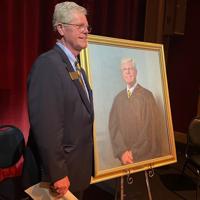Child endangering Cobb County judge prepares for senior judgeship
Governor Kemp To Approve The Application
Former Cobb County Superior Court judge, the Honorable Robert E. Flournoy, III, retired on December 31, 2022 and has publicly conveyed his intention to take the bench and continue as a “Senior Judge” any day now. The only hoop to jump through at this point is getting Governor Brian Kemp to sign off on Flournoy’s application for the coveted and prestigious role of senior judgeship. Under Georgia law, "Senior judge status . . . shall be acquired by a qualified former judge's applying to the Governor for appointment as senior judge. The Governor shall appoint each qualified applicant as a senior judge." See O.C.G.A. 15-1-9.2. So what could stop Kemp from lending his golden seal (signature) of approval? To answer that question, perhaps we should understand what keeps Judge Flournoy from being the typical “shoo-in applicant” for the position.
Circumventing the Jury in Favor of Teacher Who Slept With 17-year-old High School Student
In 2009, Christian Boone of The Atlanta Journal-Constitution (AJC) authored an article entitled It’s gross, but it ain’t illegal: Judge says teacher not guilty for having sex with student.[1] The article discusses how Judge Flournoy issued a directed verdict to bypass the jury in a case against a 36-year-old Marietta High School teacher who admitted to having a sexual relationship with a 17-year-old student. "It's gross, it's awful, but it ain't illegal," said Flournoy according to the article. "This was a consensual relationship."[2] The prosecutor in the case, Maurice Brown, argued that the teacher used his position to take advantage of a romantically naive teenager. "He led her to believe he was in love with her . . . . He led her to believe she was in love with him."[3] Navigating Justice consulted with Marietta Attorney, Matt McMaster regarding the shortcomings of Georgia's child protective laws, past, present and future, and here was his breakdown:
At the time that the It’s gross, but it ain’t illegal article was printed in 2009, O.C.G.A. § 16-6-5.1(b)-(c) read in relevant part:
(b) A . . . custodian or supervisor of another person referred to in this Code section commits sexual assault when he or she engages in sexual contact with another person who is enrolled in a school . . . and such actor has supervisory or disciplinary authority over such other person.
(c)(1) A person commits sexual assault when such person has supervisory or disciplinary authority over another person and such person engages in sexual contact with that other person who is: (A) In the custody of law; or (B) Detained in or is a patient in a hospital or other institution.
(2) A person commits sexual assault when, as an actual or purported practitioner of psychotherapy, he or she engages in sexual contact with another person who the actor knew or should have known is the subject of the actor's actual or purported treatment or counseling, or, if the treatment or counseling relationship was used to facilitate sexual contact between the actor and said person.
(3) Consent of the victim shall not be a defense to a prosecution under this subsection.. . . .
As is apparent, the use of the term “subsection” restricted (c)(3) to apply only to subsection (c) of O.C.G.A. § 16-6-5.1. Had the term “Code section” been used in place of “subsection,” the former Marietta High School teacher, Mr. Christopher King, would have undoubtedly been found guilty in that case. The Georgia Legislature re-wrote O.C.G.A. § 16-6-5.1 the following year (2010) closing the loophole by adding subsection (e), which reads: “Consent of the victim shall not be a defense to a prosecution under this Code section.”
McMaster continued, “My primary concern with what Judge Flournoy did in that 2009 case is his use of a ‘directed verdict’ to take the decision away from the jury. Why would you do such a thing when we are dealing with kids’ lives? Flournoy should have left it with the jury to decide whether the teacher used his position to take advantage of a romantically naive high school student such that it was not true consent."
The Lion's Den
A perhaps more dangerous and less known loophole exists now in light of the “new” Equitable Caregiver Act, which was enacted in 2019. “As you of course know I ran in the recent election for Superior Court Judge here in Cobb County, and my running was inspired by a case I was involved in where the judge completely misused the Equitable Caregiver Act to put a child in a very dangerous situation,” said McMaster. “I am of course referring to ‘The Lion’s Den’ case published on my campaign website. That was where a combination of judges, including Judge Flournoy, enabled the placement of a 15-year-old girl (now 17) into the home of a 42-year-old unmarried man, not blood related to her and who had a history of abusing the mother. I represented the father in that case.” Here is an excerpt from the “The Lion’s Den” article published on the mcmasterforcobb.com website:
Since that April 15, 2021 hearing, Father has not been able to communicate with his only daughter while she has been in the custody of the 42 year-old-man. Because this young lady is now 16 years old, if our worst fears materialize into reality, this man cannot be prosecuted for statutory rape under Georgia law. See O.C.G.A. § 16-6-3. No, this man did not adopt her; and no, there was no emergency warranting such a placement of this child. He is merely one of at least five (5) ex-boyfriends that the Mother has had over a period of eight (8) years, with one major caveat: he was represented by Judge Flournoy's former attorney who helped Judge Flournoy gain custody of his grandson in 2010 and also happened to be Judge Flournoy's election campaign Treasurer since 2016. I later learned that this is Judge Flournoy's lame duck term, meaning he is not running for re-election in 2022. Here is an Affidavit of the child's Aunt which shows how dangerous this man and the circumstances enabled by Judge Flournoy truly are.[4]
The Georgia Legislature identifies certain situations that leave some individuals vulnerable to the will and desires of others (e.g., school teachers, psychiatrists, law enforcement, etc.), and it is clear that Georgia sexual assault laws are created for the very purpose of deterring the exploitation of vulnerable individuals.[5] These laws do not require any proof of violence, abuse, or other improper conduct for their application and prosecution—only that the relationship exists.
"Georgia’s statutory rape law does not provide a deterrent for a 43-year-old court ordered male custodian of a non-blood-related 16-year-old girl from developing a romantic relationship with that girl while in his custody," McMaster explained. "That is what's so dangerous about what Flournoy did in 'The Lion's Den' case."

Cronyism and Bullying from the Bench
Perhaps Judge Flournoy’s most disqualifying traits are his unruly temperament on the bench and his failure to recuse himself from cases where there exists a conflict of interest. In one case still pending in Cobb County Superior Court, Case No. 20-1-04957, Judge Flournoy engaged in what was described as a "yelling match" with an attorney. A more publicized circumstance is that described in "The Lion's Den" article, involving Marietta attorney Matt McMaster, an excerpt of which is as follows:
"Listen, Mr. McMaster, you're really getting on my nerves to be honest with you.” I responded telling the Judge that "I don’t play politics." He began yelling at me telling me to appeal his decision if that is what I wanted and when I asked why he was yelling at me he said, "Because you're driving me crazy. Okay. You're really irritating me.” I responded: "I'm a human being before I'm an attorney."[6]
One of Flournoy's most notorious rulings came in 2011 in what may very well be the largest white-collar scandal in Cobb County history. According to an AJC article authored by Margaret Newkirk, Judge Flournoy threw out a 31-count racketeering and theft indictment against former Cobb EMC CEO, Dwight Brown.[7] Brown at the time was represented by the Barnes Law Group, founded by former Governor of Georgia, Roy Barnes, who appointed Judge Flournoy to the Cobb County Superior Court bench in 2000. Despite his relationship to the former Governor, Flournoy did not recuse himself from that case.
In the face of his notoriety, the Judicial Qualifications Commission (JQC)[8] has not yet shown itself as attempting to deter Flournoy. “The reality is if our judges respected the JQC, we wouldn’t have so many problems with our judiciary,” said McMaster, who has publicly been one of Cobb Judiciary's biggest critics as of late. “[Flournoy’s] decisions and influence have already enabled dangerous situations and there is no reasonable expectation that he will change his philosophy or habits once he is a senior judge. Senior judges are responsible for handling sensitive matters such as temporary restraining orders for stalking and abuse and emergency matters related to child custody. Flournoy has a reputation of succumbing to his ego, deferring his judgment to his friends, and not impartially considering the facts of a case. We can't have this with our senior judges.”
According to Open Records, Judge Flournoy sent his application for Senior Judge status to Governor Brian Kemp's office on October 24, 2022,[9] but no public announcement on the status of that request has been made as of the publishing of this article. Right now, it's all eyes on Kemp.
By
If you are aware of similar problems in Georgia legal matters, send the details and documents here: https://navigatingjustice.org/reporting/
Jan 3, 2023
References
- ↑ Christian Boone, Atlanta Journal-Constitution (AJC), It’s gross, but it ain’t illegal: Judge says teacher not guilty for having sex with student (2009).
- ↑ Christian Boone, Atlanta Journal-Constitution (AJC), It’s gross, but it ain’t illegal: Judge says teacher not guilty for having sex with student (2009).
- ↑ Christian Boone, Atlanta Journal-Constitution (AJC), It’s gross, but it ain’t illegal: Judge says teacher not guilty for having sex with student (2009).
- ↑ mcmasterforcobb.com
- ↑ Improper Sexual Contact – O.C.G.A. § 16-6-5.1
Georgia’s improper sexual contact law protects not only minors above the age of 16, but people in vulnerable situations from sexual contact and sexually explicit conduct by the following individuals:
• Foster parent;
• Person in a position of trust;
• Employee or agent of a school where the person is enrolled as a student;
• Employee or agent of the office or court where the person is under probation, parole, a program or within a facility as a condition of probation or parole;
• Employee or agent of any law enforcement agency detaining the person;
• Employee or agent of a hospital in which the person is a patient;
• Employee or agent of a correctional facility, juvenile detention facility, facility providing services to a person with a disability, or a facility providing child welfare and youth services that the person is in the custody of;
• Employee or agent providing psychotherapy treatment or counseling to the person; and
• Employee or agent of a sensitive care facility where the person is admitted. - ↑ mcmasterforcobb.com
- ↑ https://www.ajc.com/news/local/judge-throws-out-cobb-emc-indictment-citing-courtroom-accessibility/dEdeHrvTkoBAAnS10xiEQI/ Margaret Newkirk, Judge throws out Cobb EMC indictment, citing courtroom accessibility]
- ↑ The Judicial Qualifications Commission was created by Constitutional Amendment in 1972, then reconstituted by Constitutional Amendment in 2016, to conduct investigations and hearings with respect to complaints of ethical misconduct by Georgia judges. The Commission is also authorized to issue Advisory Opinions regarding judicial misconduct. Read more at gajqc.gov.
- ↑ Judge Robert E. Flournoy, III Request For Appointment as Senior Judge

